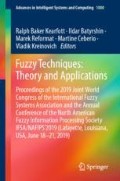Abstract
This paper studies multiple aspects of modeling user preference in a heterogeneous environment, where different individuals describe their level of comfort with the temperatures in different rooms in a building. The study shows that sampling based on fuzzy clustering provides the best approach for addressing the imbalance resulting from limited feedback points. Another issue addressed in the paper is a comparison of models based on agglomerated dataset for the entire building versus datasets for individual rooms. Ideally, personalized models for individual rooms should provide the best models. However, the number of feedback points for individual rooms is much smaller resulting in even larger imbalance in data. In many diagnostic situations in engineering and health sciences, recalling the critical decisions is more important than the prediction accuracy. The paper studies the quality of modeling by maximizing recall versus maximizing the AUC of models.
Access this chapter
Tax calculation will be finalised at checkout
Purchases are for personal use only
References
MacDonald, R., Neveditsin, N., Lingras, P., Qin, Z., Hillard, T.: Sampling using fuzzy and crisp clustering to improve recall of building comfort feedback. In: International Conference on Fuzzy Systems, vol. 1, no. 1, pp. 1–6 (2019)
Burez, J., Van den Poel, D.: Handling class imbalance in customer churn prediction. Expert Syst. Appl. 36(3), 4626–4636 (2009). http://dx.doi.org/10.1016/j.eswa.2008.05.027
Kuhn, M.: The caret package (2018). https://cran.r-project.org/package=caret
Hartigan, J.A., Wong, M.A.: Algorithm AS136: a k-means clustering algorithm. Appl. Stat. 28, 100–108 (1979)
MacQueen, J.: Some methods for classification and analysis of multivariate observations. In: Proceedings of Fifth Berkeley Symposium on Mathematical Statistics and Probability, vol. 1, pp. 281–297 (1967)
Dunn, J.C.: A fuzzy relative of the ISODATA process and its use in detecting compact well-separated clusters. Cybernetics 3(3), 32–57 (1973). http://dx.doi.org/10.1080/01969727308546046
Bezdek, J.C.: Pattern Recognition with Fuzzy Objective Function Algorithms. Kluwer Academic Publishers, Norwell (1981)
Pal, N.R., Bezdek, J.C., Hathaway, R.J.: Sequential competitive learning and the fuzzy c-means clustering algorithms. Neural Netw. 9(5), 787–796 (1996)
Kuhn, M.: Applied Predictive Modeling. Springer, New York (2013)
Author information
Authors and Affiliations
Corresponding author
Editor information
Editors and Affiliations
Rights and permissions
Copyright information
© 2019 Springer Nature Switzerland AG
About this paper
Cite this paper
MacDonald, R., Neveditsin, N., Lingras, P., Hillard, T. (2019). Effect of Maximizing Recall and Agglomeration of Feedback on Accuracy. In: Kearfott, R., Batyrshin, I., Reformat, M., Ceberio, M., Kreinovich, V. (eds) Fuzzy Techniques: Theory and Applications. IFSA/NAFIPS 2019 2019. Advances in Intelligent Systems and Computing, vol 1000. Springer, Cham. https://doi.org/10.1007/978-3-030-21920-8_32
Download citation
DOI: https://doi.org/10.1007/978-3-030-21920-8_32
Published:
Publisher Name: Springer, Cham
Print ISBN: 978-3-030-21919-2
Online ISBN: 978-3-030-21920-8
eBook Packages: Intelligent Technologies and RoboticsIntelligent Technologies and Robotics (R0)

